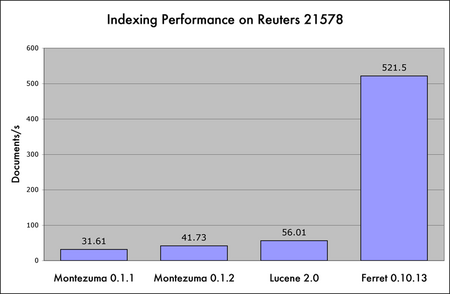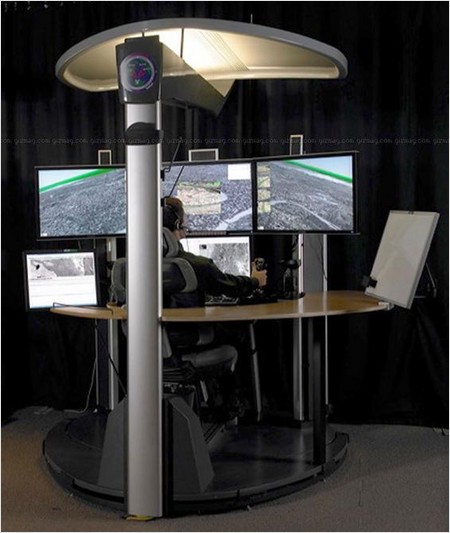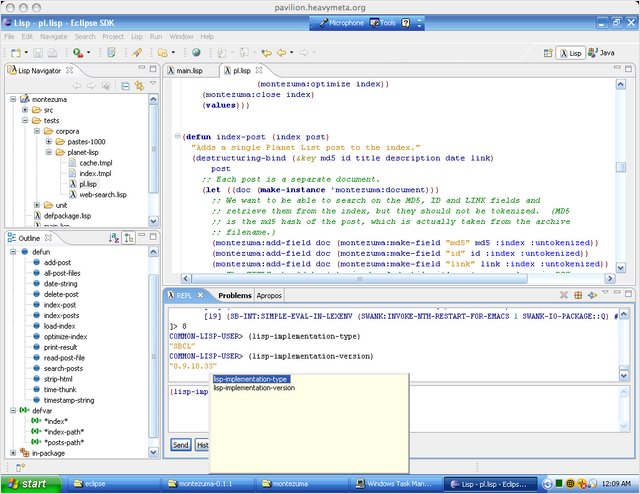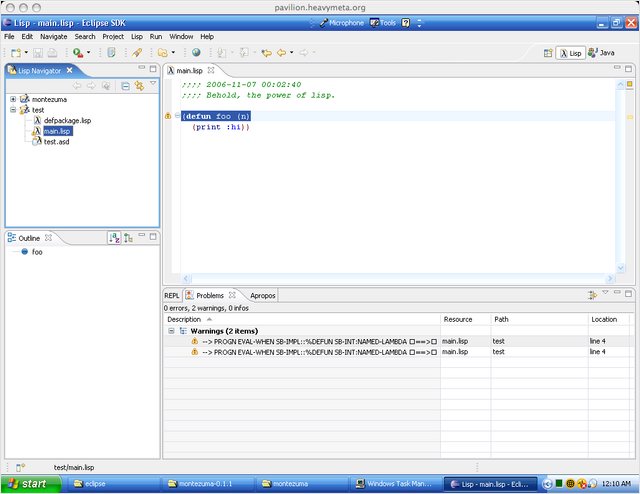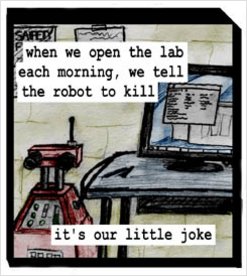November 29, 2006
SBCL, mmap and New Unix Tricks

Photo by alen.
This is what I was seeing on my Fedora Core (FC5) system:
[wiseman@dhcppc4 ~]$ sbcl mmap: wanted 41938944 bytes at 0x1000000, actually mapped at 0xb55f1000 ensure_space: failed to validate 41938944 bytes at 0x01000000 (hint: Try "ulimit -a"; maybe you should increase memory limits.)
Standard advice is the following:
- Make sure you really do have enough memory and your ulimits are reasonable.
- Use setarch:
setarch i386 sbcl
- Disable Exec Shield:
echo 0 > /proc/sys/kernel/exec-shield
- Disable memory map randomization:
echo 0 > /proc/sys/kernel/randomize_va_space
None of those was sufficient for me. James Y. Knight supplied the crucial missing step:
- Disable prelinking. First un-prelink the particular library causing me problems:
prelink -u /lib/libpthread-2.4.so
Then tell the prelinking cron job to un-prelink everything the next time it runs by setting PRELINK=no in /etc/sysconfig/prelink.
November 22, 2006
Kunst ist Scheisse
“AeroVironment RQ-11B Raven B small unamanned air vehicle (UAV) performing a flight demonstration in controlled airspace in Brisbane, Australia when it gets attacked by crows.”
Those guys were just screwing around. But when Natalie Jeremijenko does the same thing, she gets in the Whitney Biennial. “Goosing_ 7714: a folorn leda [robotic goose 5.6] piloted by humans ashore experiences social rejection from her biological counterparts from OOZ Goose translation database, February 15, 2004.”

November 20, 2006
Montezuma Benchmarking
I finally got around to doing some performance comparisons of Montezuma, Ferret and Lucene.
I'm glad that Montezuma is pretty close to Lucene, but wow, Ferret's performance is just awesome (helped by 65,000 or so lines of C code).
November 19, 2006
ILC 2007 Registration Open

Ally at the ruins of Whitby Abbey.
Registration for ILC 2007 is now open, and a number of speakers have been announced [via Pascal Costanza].
November 17, 2006
Pronto4 Universal Retrofit Kit for Autonomous Vehicles
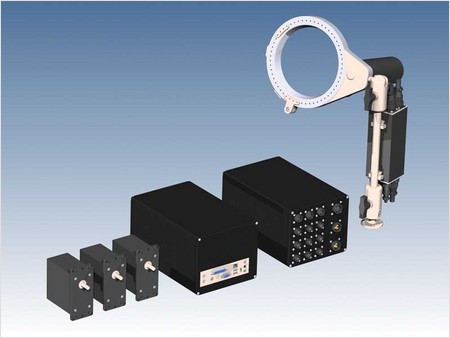
I picture the local news segment starting like this: “Want to ‘autonomize’ your ‘Accord’?!” But it might not really be very hard to do, if Kairos Autonomi's Pronto4 “universal unmanned vehicle retrofit kit” is actually universal.
The Pronto4 Retrofit Kit successfully enables unmanned vehicle navigation on the Earth's surface by providing a universal retrofit kit for existing vehicle platforms. This compact, modularly-constructed hardware system is capable of installation anywhere in the field in a four-four-four process — a four-person team can install four backpack-sized modules in four hours. With the Pronto4, you can have a superior, affordable, unmanned solution right now.
Turn your beater into a JAUS-compliant remotely piloted vehicle with the Pronto4. Then just purchase the K-driver guidance software to upgrade the hoopty to be a completely autonomous ground vehicle.
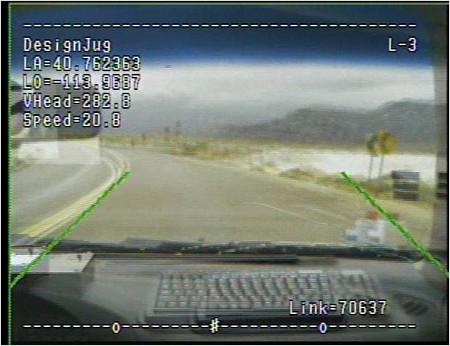
Kairos Autonomi is a subsidiary of DesignJug, which sponsored Team Juggernaut in the 2005 Grand Challenge.
November 16, 2006
Lisp FAQs
Peter Seibel moved his “new” Lisp FAQ (previously mentioned here) to Google's code hosting.
And Jeff Shrager is working on a “meta FAQ” for newbies in comp.lang.lisp. See discussion here and here.
November 15, 2006
Raytheon Universal Control System
Raytheon has built a “Universal Control Station” for UAVs:
“We took the best-of-breed technologies from the gaming industry and coupled them with 35-years Raytheon UAS command and control expertise and developed a state-of-the-art universal cockpit built around the operator," said Mark Bigham, business development director for Raytheon's Intelligence and Information Systems business. "We broke down the operator's tasks and objectives and constructed a system built entirely around them, rather than building the system around the air vehicle first, without input from the operators.”
They're apparently motivated by safety concerns:
A 2004 Federal Aviation Administration study titled “A Summary of Unmanned Aircraft Accident/Incident Data: Human Factors Implications,” states that “a common theme across many of the mishaps reported involved a problem with the command interface to the system.” The study also noted that “in the systems analyzed, human factors issues were present in 21 percent (Shadow) to 67 percent (Predator) of the accidents ... [these] numbers suggest there is room for improvement if specific human factors issues can be identified and addressed.”
Speaking of safety, it's possible that the first death caused directly by a UAV crash has occurred (is that accident related to this one? Every reference to this alleged fatal accident seems to derive from this flightglobal.com article).
November 14, 2006
Energid's Robot Bridges
The company I'm currently contracting for, Energid, made Robot Gossip:
Four of the gates at Denver International Airport are now using robot bridges move passengers on and off the planes. The passenger bridges made by Dewbridge are smart enough to find the doors of the planes and dock without help from any people. These passenger tunnels are also double-armed to allow opening both front and rear doors of the planes.
The bridges use Energid Technologies' vision system and object recognition technology to find the doors on the planes. The vision system is supposed to work in any kind of weather including rain and snow and to be able to recognize the doors regardless of the color or patterns painted on the plane.
And it looks like Evolution Robotics is working on a Roomba competitor, for real.
Evolution Robotics Retail, on the other hand, has what seems to be a non sequitur on their front page:

I understand what they're getting at, but that's not really an answer to the question.
November 13, 2006
Powerset Series A
Powerset announced that it raised $12.5 million in its first round of VC funding (for what VentureBeat says is a $42.5 million valuation) [via Will].
This MarketWatch article may be the first time anyone's described, publicly and specifically, what it's like to use Powerset's search engine (I tried it in May, woo!)
November 09, 2006
CDR 3

Steve McQueen's 1953 998cc Vincent Black Shadow
The Common Lisp Document Repository is up to three documents; I'm pleasantly surprised that they made it this far.
CDR 3: “Revisiting CONCATENATE-SEQUENCE”, Christophe Rhodes
CDR 2: “A generic hash table interface specification for Common Lisp”, Ingvar Mattsson
November 08, 2006
Aha!
It's a few weeks old, but I liked Zach Beane's post to comp.lang.lisp about “Aha! moments.”
I always like to read specific accounts of this sort of thing, but his description of the themes and his advice are great:
A few themes:
- Despite conceptually understanding how tools like CLOS and
closures and conditions work, it took a tricky problem solved
neatly by the tool to really make an Aha! moment
- Aha! moments have made complicated tasks simpler and
unapproachable tasks approachable (given the right amount of time
and effort). They take the magic out of things. (Philip Greenspun
used to say that his course would teach undergrads how to build
Amazon in a semester; despite the hyperbole, it really did take
the mystery out of how useful web applications can be
constructed.)
Advice:
- Be actively curious about how interesting things work ("how can
cl-ppcre be faster than Perl?")
- Be broadly aware of the tools available, and don't worry about
immediate application
- Don't settle for tedium (it's hard to have a breakthrough if you
have resigned yourself to something that feels substandard)
- People who write one interesting thing usually keep it up; find
and watch interesting people (trickle-down Aha! effect?)
November 07, 2006
Cusp
Tim Jasko's Lisp plugin for Eclipse, Cusp, isn't officially released yet, but it's kind of slick so far (and supports Windows, OS X and Linux).
In this screenshot you can see the Lisp Navigator/Project View, the outline of the file currently being edited, and a simple REPL (in which you can see that Cusp bundles and uses SBCL):
In the next shot, toward the bottom of the window you can see some warning messages from a compile.
It looks like Tim works at Paragent, which is hiring Lisp programmers.
November 06, 2006
Franz Japan Lisp Seminar
Franz is putting on a three day Lisp seminar in Tokyo, and it's free.
========== Japan Lisp Seminar 2006 ============= <SPEAKERS AND TALK TITLES> *Carl Shapiro (SRI Int'l and Vice President of Association of Lisp Users) - Geospatial Image Understanding in Common Lisp *Ralph Hodgson (TopQuadrant) - Why Semantic Technology is Important - The Semantic Technology Terrain *Taiichi Yuasa (Kyoto University) - A Lisp Interpreter i-αpplisp that runs on Mobile Phones *Shiro Kawai (Scheme Arts, LLC) - Lisp-based Portal Site for National Institute for Materials Science (NIMS) of Japan *Kazuo Hashimoto (Tohoku University) - Future of Semantic Web Technology *Shozaburo Nakamura (Antenna House) - Lisp: Evolution of Computer Programming Universe *Seiji Koide (National Institute of Informatics) - Semantic Web, Deployment and Lessons Learned *Yutaka Miyake (KDDI R&D Labs.) - Lisp-based Automatic Security Management System *Hisao Kuroda (Mathematical Systems, Inc.) - Create Your Own Google-like Search Engine with AllegroCache - Learn Ontology by Playing with RacerPro *Fritz Kunze (Franz Inc.) - Recent Technology Investments at Franz - Future of Semantic Web Technology *Jans Aasman (Franz Inc.) - 4-hour Hands-on Tutorial of AllegroGraph - AllegroGraph Semantic Web Application <ADMISSION FEE> Free! <FOR MORE INFO AND/OR REGISTRATION> http://jp.franz.com/base/seminar-2006-11-22.html (Japanese) <WHEN & WHERE> November 20 (Mon) 01:30pm - 5:30pm Location: http://www.msi.co.jp/msi/location_en.html November 21 (Tue) 10:00am - 5:30pm (Party from 5:35pm to 7:00pm) Location: http://www.msi.co.jp/msi/location_en.html November 22 (Weds) 01:30pm - 5:00pm (Party from 5:00pm to 6:30pm) Location: http://www.roppongihills.com/en/facilities/
November 05, 2006
Lispjobs Blog
Will Fitzgerald's lispjobs.com has moved to lispjobs.wordpress.com and become a real blog, with comments and categories/tags (so you can view all the plus-good jobs on one convenient page).
November 03, 2006
Word on MCL for Intel Macs

“A unit of StuG III assault guns stands ready for review. They are accompanied by a Überschwerer Kampfschreitpanzer (Superheavy Armored Walking Tank), also known as a ‘Thor's Hammer.’ Eastern Front circa 1943.”
A short update from Digitool on the status of MCL for Intel Macs:
To the MCL community,
I apologize that it has taken so long for us the answer the questions about MCL and the new Intel Macs.
The short answer is that we are working on a port to the Intel machines. We don't have an accurate idea of when the port will be ready, but it is a priority. The port is made difficult because Apple uses Intel processors with only 8 general purpose registers. Other vendors use Intel processors with 16 general purpose registers. Changing from 32 general purpose registers on PPC to the 8 registers on the Intel Macs is much more complicated than it would be to transition from 32 to 16 general purpose registers. The 68K had 16 semi-general purpose registers - 8 "A" registers and 8 "D" registers.
An additional problem is that the Apple Rosetta dynamic translator that is supposed to be able to run PPC applications on Intel processors does not work for some applications and MCL is one of those. Apple has given no indication that they intend to fix the translator.
I hope I have answered any questions about the future of MCL, but if there is anything else anyone would like to know please feel free to contact me.
